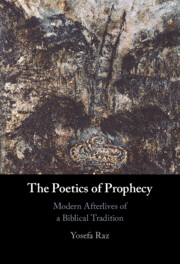Book contents
- The Poetics of Prophecy
- The Poetics of Prophecy
- Copyright page
- Dedication
- Contents
- Illustrations
- Acknowledgements
- Introduction
- Chapter 1 Seraphic Choirs and Stuttering Prophets: Symmetry, Disorder, and the Invention of the Literary Bible
- Chapter 2 Walking through William Blake’s Irregular Bible
- Chapter 3 The Myth of Primordial Orality and the Disfigured Face of Written Prophecy
- Chapter 4 Ahad Ha’am’s Mask of Moses and the Secularization of Prophetic Power
- Chapter 5 Haim Nahman Bialik: The National Poet’s Cup of Sorrows
- Afterword
- Bibliography
- Index
- Index of Biblical Quotes
Chapter 1 - Seraphic Choirs and Stuttering Prophets: Symmetry, Disorder, and the Invention of the Literary Bible
Published online by Cambridge University Press: 14 December 2023
- The Poetics of Prophecy
- The Poetics of Prophecy
- Copyright page
- Dedication
- Contents
- Illustrations
- Acknowledgements
- Introduction
- Chapter 1 Seraphic Choirs and Stuttering Prophets: Symmetry, Disorder, and the Invention of the Literary Bible
- Chapter 2 Walking through William Blake’s Irregular Bible
- Chapter 3 The Myth of Primordial Orality and the Disfigured Face of Written Prophecy
- Chapter 4 Ahad Ha’am’s Mask of Moses and the Secularization of Prophetic Power
- Chapter 5 Haim Nahman Bialik: The National Poet’s Cup of Sorrows
- Afterword
- Bibliography
- Index
- Index of Biblical Quotes
Summary
In order to understand the Romantic fascination with prophets, we begin with an influential eighteenth-century figure poised on the cusp of neoclassicism and Romanticism: the English biblical scholar Robert Lowth – also a medieval historian, a shrewd politician, and the author of a bestselling English grammar handbook, who was destined to become the Bishop of London. Lowth is a key figure in the creation of the modern “poetics of prophecy.” Taking an approach which would become known in the nineteenth and twentieth centuries as “the Bible as literature,” Lowth initiated and represents an important new way of regarding the Bible aesthetically, one which we encounter through his construction of Isaiah as a strong prophet. Yet examining the fissures in Lowth’s ideal Isaiah – who he reads as a perfect combination of elegance and sublimity – can also help us think more critically about the literary study of the Bible.
Keywords
- Type
- Chapter
- Information
- The Poetics of ProphecyModern Afterlives of a Biblical Tradition, pp. 27 - 55Publisher: Cambridge University PressPrint publication year: 2023

